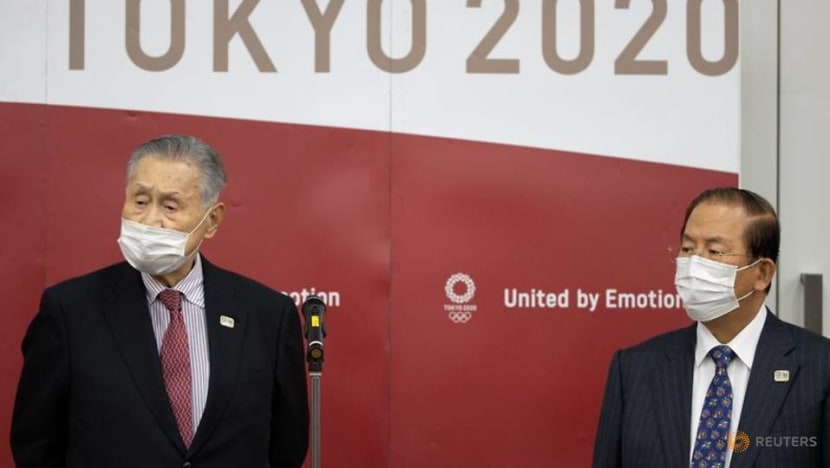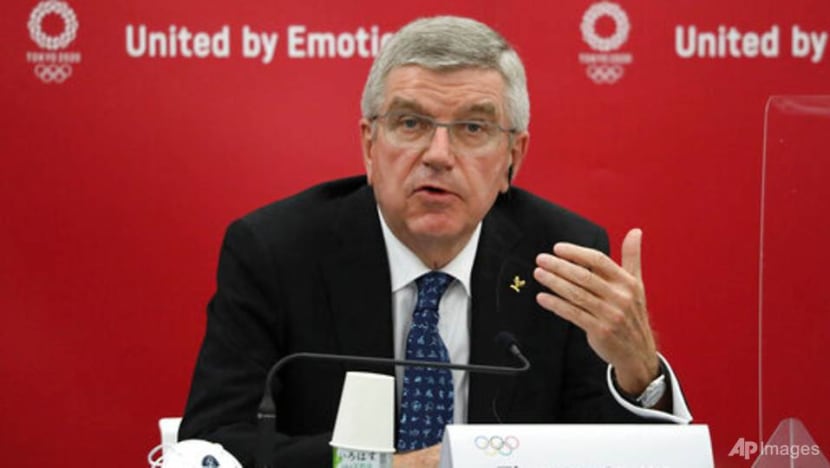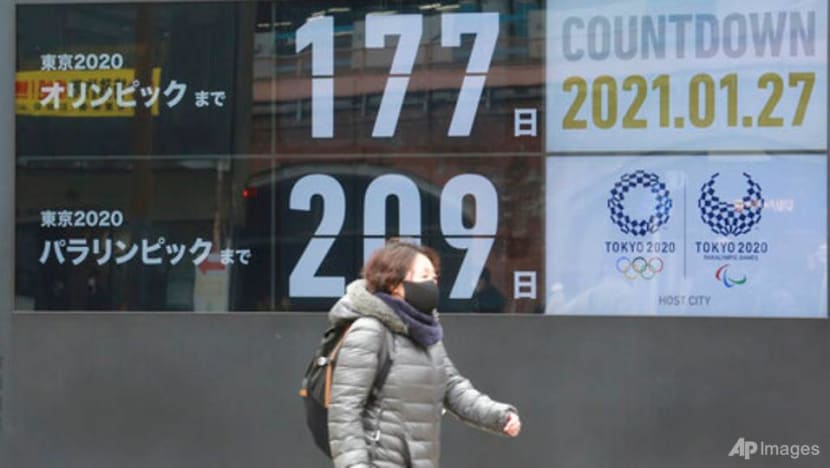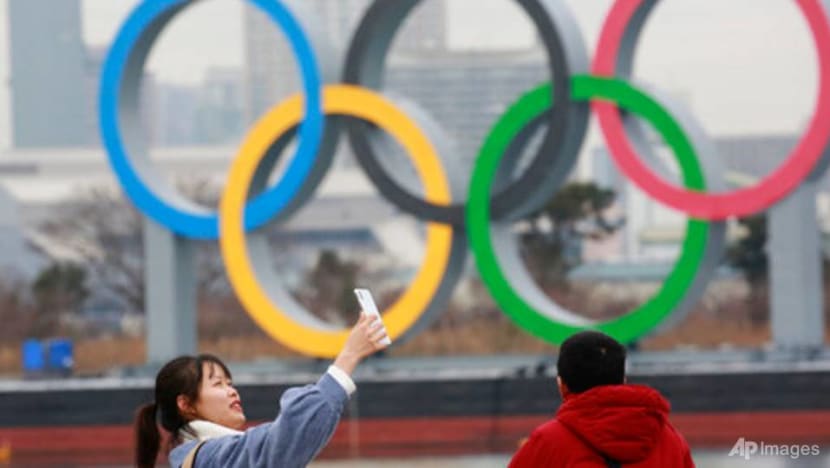commentary Commentary
Commentary: There is no shame in cancelling the Olympics now when options remain
A state of emergency in Tokyo this month has prompted a growing debate as to whether the games will be able to go ahead despite reassurances from organisers, says John Duerden.

Tokyo Olympic and Paralympic Games Organising Committee (TOGOC) President Yoshiro Mori (L) and CEO Toshiro Muto speak to the media after a video conference with IOC President Thomas Bach at the TOGOC headquarters in Tokyo, Japan January 28, 2021. Takashi Aoyama/Pool via REUTERS
SINGAPORE: On Mar 24, 2020, the 2020 Tokyo Olympics were cancelled due to the growing COVID-19 outbreak and rescheduled for July 23, 2021 when it was assumed that the situation would have returned to normal.
Yet the first quarter of 2021 is starting to feel a lot like 2020 – rising infections and continued lockdowns across the world, despite the vaccination being rolled out in many countries.
A state of emergency in Tokyo this month has prompted a growing debate as to whether the games will be able to go ahead despite the all-too familiar reassurances from organisers in Japan and the International Olympic Committee (IOC).
LET THE GAMES BEGIN
The official line is however that cancellation is not on the table.
There are several reasons why organisers are persisting with carrying on with the Games.
First, and most pertinent, is financial. if there were no games at all, that could leave a US$3 billion hole in the IOC’s finances.
This would feed down to affect sporting federations around the world, many of which rely on financial support from the IOC to train athletes and provide facilities and coaching.

Cancelling the Games would see Tokyo too losing out financially. Official figures have put the country’s spending at US$15.4 billion though it has been suggested that the actual figure could be US$10 billion higher.
Such a loss, as the Japanese economy reels from a pandemic-caused slowdown, could be politically damaging for a new Prime Minister who is less than six months into the job.
It is understandable then there is a reluctance to cancel the Olympics unless absolutely necessary.
A second, but perhaps less significant, reason for not cancelling the Games is that it would be a devastating blow for athletes who may have to wait another few years for the next Games. By then, some of the sporting talent may have to retire.
READ: Commentary: The Australian Open has lessons for large sports events in Singapore
For instance, when the Games were postponed from last summer to this year, China’s badminton legend Lin Dan decided to hang up his racket and not pursue a third Olympic gold medal at the age of 36.
COVID RUNNING RAMPANT
Already unprecedentedly postponing the Games once, it is natural the organisers are keen to carry on, especially when there are more than five months to July.
"We're not losing time or energy on speculation ... about whether the Games are taking place," IOC president Thomas Bach said on Jan 27.
"We're working on how the Games will take place. Our task is to organise Olympic Games, not to cancel Olympic Games ....I think it is too early to decide anything else," he added.

Bach said something similar in 2020 before bowing to the inevitable. What is worrying for the IOC is that the current situation is more serious than last year.
Firstly, the situation in Japan has escalated. On Jan 6, Japanese Prime Minister Yoshihide Suga announced that Tokyo was one of the 11 out of 47 prefectures in the country to be placed in a state of emergency due to rising cases.
It is expected that the state of emergency will be extended past Feb 7.
On Jan 28, the artistic swimming event, the first Olympic test event of the year, was postponed due to travel restrictions. It was due to take place from Mar 4 to Mar 7 but has been pushed back until May.
Coming in the wake of reassurances from organisers, it was not a good sign, especially since much of the country seems to be against hosting the games.
A poll in early January from Japan’s Kyodo News Agency showed that 80 per cent of respondents believed that the event should be postponed again or cancelled outright.
READ: Commentary: Japan's self-sabotaged COVID-19 journey may finally come to an end
READ: Commentary: Sweden and Japan are paying the price for thinking they had COVID-19 exceptionalism
It is not just about the COVID-19 situation in Japan however. There is a surge of cases around the world, fuelled by new and more dangerous strains in the virus that have been found in various countries.
Much of Europe, the Americas, Asia and Africa are struggling to cope with the number of cases and deaths and it remains to be seen if the situation will be comfortable by July even though there is a glimmer of hope that the vaccinations being rolled out will help ease the problem.
At the moment, the idea of 11,000 athletes from over 200 countries going to Japan is, in the words of British Olympic legend, Matthew Pinsett “ludicrous”.
Moreover, with several countries having strict measures against sports and outdoor activities, athletes in these places may also not have been able to practice as much as they usually would – meaning that they may not be in peak condition if the Games were to be held in July.
WITHOUT SPECTATORS
Sir Keith Mills, CEO of the London 2012 Olympics, weighed in on the discussions on Jan 19 that “it looks unlikely” that the games will go ahead this year.

“If I was sitting in the shoes of the organising committee in Tokyo, I would be making plans for a cancellation and I'm sure they have plans for a cancellation,” he said.
Given the risks, there is clearly no shame in the organisers cancelling the Olympics or postponing it yet again. But there may be alternatives.
There have been calls for the event to take place without fans even though 4.4 million tickets have already been sold.
Former IOC president Dick Pound told Kyodo News in January that this is an option. "The question is — is this a ‘must-have’ or ‘nice-to-have.’ It’s nice to have spectators. But it’s not a must-have.”
Staging the event without fans would reduce the event as a spectacle and reduce the public health risks of having an event of this magnitude.
It would mean that the Olympics would follow in the footsteps of many other sporting events around the world that are going ahead in empty stadiums.
Doing so will see organisers lose an expected US$800 million worth of ticket sales. However, the IOC receives about three quarters of its revenue from broadcasting rights, which will still be collected if there were no fans present.
COULD VACCINES MAKE A DIFFERENCE?
One reason to delay any decision is that there is hope that a number of vaccines are starting to be rolled out in certain countries.
Japan however is not due to start its vaccination program until the end of February and it is estimated that it will not achieve a 75 per cent inoculation rate - a benchmark for herd immunity - until October.

Moreover, there is no guarantee that the majority of the world's population will be inoculated before July. Many poorer nations have yet to receive any access to the vaccine at all.
With supplies still in short supply, it is questionable if it is ethical to prioritise healthy athletes over other sections of society that are more vulnerable to the virus – as Mike Ryan, the top emergency expert at the World Health Organisation, alluded to on Jan 25.
“We have to face the realities,” Ryan said. “There is not enough vaccine right now to even serve those who are most at risk.”
If Tokyo decides to cancel the Olympics, opinions are mixed as to whether there would be another chance, should the city and the country be in favour.
“It’s either 2021, or nothing," said Pound but others have called for Tokyo to be given the 2024 games that are planned for Paris, then the French capital takes the 2028 games from Los Angeles which moves back to 2032.
Others have said that Japan should be given the 2032 games - the next available slot - although it may well be that there would be no interest in Tokyo for then.
READ: Commentary: COVID-19 has forced us to rethink stadiums and sports facilities
READ: Commentary: Pulling off 2021 Olympics is a win Japan needs
Such considerations, however important they may be, should come second to public health risks. But if organisers change their mind on going ahead with the Olympics in its current form, then doing so now may help them consider alternatives to minimise financial loss.
NO SHAME IN CANCELLING
Last September, Oxford University suggested options to cut costs for hosting the Olympics that included having semi-permanent hosts around the world or a city hosting the event twice in succession.
Other suggestions include multiple locations around the world hosting separate events to reduce the burden on one location.
The pandemic has already forced all of us to be innovative and novel in most aspects of our lives.
The Olympics can also experiment with these hybrid models so as to not heighten global pandemic risks by going ahead.
When it comes to public safety, there are always better options and there’s no shame in that.
John Duerden has lived in Asia for 20 years and covers the region’s sporting scene. He is the author of three books including Lions & Tigers - The History of Football in Singapore and Malaysia (2017).















